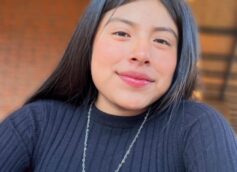heading
We conducted a diagnosis of the community issues in Teotitlán del Valle, focusing primarily on the scarcity of water for productive activities. The principal economic activity, rug production, utilizes clean water for dyeing with both natural and synthetic dyes, leading to the disposal of untreated inked water. Employing the Logical Framework approach, we proposed the development of a home filter to facilitate the reuse of inked water in vegetable cultivation. This project entails the evaluation of filtered water samples from homemade filters designed specifically for natural and synthetic dyes. Through experimental and observational assessments, we measured pH levels and coloration before and after filtration, noting variations with pH values ranging from 7 to 8. The filtered water was subsequently used for the germination of spinach and radish seeds, with further experimentation planned for other appropriate vegetables. The objective of this project is to establish a sustainable system that enhances family economies and nutrition, contributes to environmental conservation, and provides a viable water reuse strategy for the community.
This is how I came up with the idea for this project:This project idea originated from our deep connection to our community's textile heritage. In our village, textiles are not just products; they are a testament to our traditions, crafted with techniques passed down through generations. With over 70% of our community involved in textile production, we faced a pressing challenge: the environmental impact of dyeing practices. Traditionally, dyeing one kilogram of wool yarn requires a staggering 15 liters of water. Recently, the use of artificial dyes like aniline and acids has surged, leading to the direct disposal of contaminated water into our environment. This threatens our local water bodies and soil, endangering both our health and the sustainability of our cherished practices. Faced with this dilemma, we refused to abandon our ancestral craft. Instead, we envisioned a solution rooted in sustainability: a homemade filtration system. This system aims to purify the wastewater from dyeing processes, allowing us to transition towards a circular economy. By reclaiming and reusing water, we can mitigate pollution while preserving our cultural heritage and supporting our local economy.

Documentation
Reuse of Inked Water with Homemade Filtration to Produce Veggie Gardens We conducted a diagnosis of the community issues in Teotitlán del Valle, focusing primarily on the scarcity of water for productive activities. The principal economic activity, rug production, utilizes clean water for dyeing with both natural and synthetic dyes, leading to the disposal of untreated inked water. Employing the Logical Framework approach, we proposed the development of a home filter to facilitate the reuse of inked water in vegetable cultivation. This project entails the evaluation of filtered water samples from homemade filters designed specifically for natural and synthetic dyes. Through experimental and observational assessments, we measured pH levels and coloration before and after filtration, noting variations with pH values ranging from 7 to 8. The filtered water was subsequently used for the germination of spinach and radish seeds, with further experimentation planned for other appropriate vegetables. The objective of this project is to establish a sustainable system that enhances family economies and nutrition, contributes to environmental conservation, and provides a viable water reuse strategy for the community.
